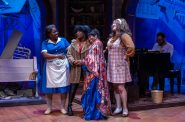Florentine “Albert Herring” gets funny — eventually
Florentine Opera's staging of Benjamin Britten's 1947 comedy takes a while to find its groove. The show runs through March 17.

L-R: Kathryn Leemhuis, Andrew Wilkowske, Kathy Pyeatt, Jamie Offenbach, Alisa Suzanne Jordheim, Kevin Newell. All photos by Kathy Wittman, Ball Square Films.
Many operas, especially farcical ones, plod through expository first acts then perk up in the second and third. Such was the case with Benjamin Britten’s Albert Herring Friday night, in the Florentine Opera’s new production of the 1947 comedy.
Act 1 involves the civic leaders of an English country village, c. 1919, as they gather at the bidding of Lady Billows to decide upon a properly chaste girl to reign as Queen of the May. Her Ladyship’s housekeeper, Florence, has compiled a list of transgressions that rule out every otherwise-eligible girl. I suspect that they bat about a great deal of witty banter as they deliberate. But I can only suspect, as I could make out just a few words among the torrent of them in Eric Crozier’s libretto. Marcus Center’s Vogel Hall is not technically congenial to projected titles, so no help there.
Though the orchestra, led by Christopher Larkin, is small, it includes active percussion, horn, clarinet and flute parts. They rarely play chords that support the singers. Mostly they engage in elaborate counter-melody and counterpoint, another barrier to understanding. Finally, Vogel Hall has no pit; the orchestra sat at the apron of the stage, directly between us and the singers. The acoustic is such that even the lightest tap on a cymbal fills the hall.
You might recall the double bill of Baroque English operas the Florentine staged so brilliantly at Vogel in 2011. The same set-up worked wonderfully then in terms of balance and comprehension of text. What was different?

Abigail Nims and Carl Frank, as Nancy and Sid, inspire (and conspire) Rodell Rosel’s Albert to assert himself. Kathy Wittman/Ball Square Films.
First, the Baroque orchestra comprised strings and keyboard only. Second, the orchestral textures beneath the singers were far simpler. Third, the libretti for Henry Purcell and John Blow’s operas are thin texts with a lot of repetition. Britten’s opera is through-composed and more thickly scored, and its story advances conversationally, with very little repetition to help us grasp the words.
None of this is issue in a tragedy, as the musical and visual aspects can convey boy-meets-girl-boy-dies. But a sparkling comedy requires the wit of its words, and we got next to nothing in Albert Herring Act 1. I hasten to add that all three acts of this opera offer purely musical delights. Each of the 13 characters has a little motive, which Britten weaves ingeniously into the textures. I very much admire the way Britten uses certain themes to unify long stretches of the opera, particularly the ironic way the pious chorale, “Albert the Good,” permeates the scene of his return from a night of debauchery.
I’m pleased to say that the opera became more and more legible as it went on. Britten turns more toward solo and less toward ensemble, thins out the orchestration a little (especially for the important solo passages), and slows tempos in the key arias and ariosos. As a result, Acts 2 and 3 charm and amuse a great deal more than Act 1 of this three-hour comedy.
Tenor Rodell Rosel, as the timid, repressed, resentful and finally liberated title character, has little to do until halfway through the opera, but he stole the show late. Lady Billows and the stuffy village elders name Albert King of the May, since they’re quite sure this mama’s boy shopkeeper is more virginal than the local girls. Albert accepts the humiliation and the £25 that go with it. When friends lace his lemonade with rum, liquid courage prompts him to question his life. Rosel is brilliant — and entirely comprehensible — in this long, complex round of vacillation and decision, which ultimately comes down to a toss of one of his shiny new coins. The effortless, conversational quality of Rosel’s singing fits the character exactly. He conveys the smoldering rebellion under a veneer of immovable resignation, which will shield him from the indignation of Lady Billows’ circle after his liberating night on the town.
A fine cast of alert singing actors surrounds Rosel. Under William Florescu’s direction, they found just the right level of stylization. Even when you can’t make out the words, this Albert Herring can be pretty funny — Holly Payne’s costumes helped that along. I couldn’t look at Pyeatt without laughing; decked out in a puffed-up wig by Dawn Rivard and Payne’s voluminous gowns and hats, she projected ridiculous grandeur of a Spanish galleon under full sail.
In 2011, Florescu and scenic designer Noele Stollmack came up with a brilliant idea for coping with Vogel’s scenic limitations: They concocted the conceit that we were watching a rehearsal of English Baroque nobles participating on nearly finished set adorned with ladders, bits of stage machinery and boxes of props. No such imaginative lightning struck for Albert Herring, which plays out against white walls and on green indoor-outdoor carpet. The set is as drab as a vacant low-end condo. Why?
Cast and Credits
Rodell Rosel, Albert Herring; Abigail Nims*, Nancy; Kathy Pyeatt, Lady Billows; Kathryn Leemhuis*, Florence Pike; Alisa Suzanne Jordheim†, Miss Wordsworth; Andrew Wilkowske*, Mr. Gedge, The Vicar; Kevin Newell†, Mr. Upfold, The Mayor; Jamie Offenbach, Superintendent Budd; Kristen DiNinno†, Mrs. Herring; Carl Frank†, Sid; William Florescu, Stage Director; Christopher Larkin, Conductor; Noele Stollmack, Scenic and Lighting Designer; Holly Payne, Costume Designer (*denotes Florentine Opera debut, †denotes Florentine Opera Studio Artist).
Performance Schedule
Vogel Hall, Marcus Center for the Performing Arts
929 N. Water St., Milwaukee, WI
Sunday, March 10, 2:30 p.m.
Tuesday, March 12, 7:30 p.m.
Wednesday, March 13, 7:30 p.m.
Friday, March 15, 7:30 p.m.
Sunday, March 17, 2:30 p.m.
Ticketing and Ancillary Events
Pre-Opera Meals: The Florentine Opera offers Friday dinners and Sunday lunches prior to weekend performances of Albert Herring. Meals are served at 5:30 p.m. on Fridays (March 8 and 15) and 12:30 p.m. on Sundays (March 10 and 17). General director William Florescu will attend dinners and lunches. The cost is $35. Call 414 291-5700 ext 213 for reservations.
Theater
-
‘The Treasurer’ a Darkly Funny Family Play
 Apr 29th, 2024 by Dominique Paul Noth
Apr 29th, 2024 by Dominique Paul Noth
-
Rep’s Nina Simone Play a Puzzle
 Apr 23rd, 2024 by Dominique Paul Noth
Apr 23rd, 2024 by Dominique Paul Noth
-
Skylight’s ‘Eternity’ Is a Slam Bang Show
 Apr 15th, 2024 by Dominique Paul Noth
Apr 15th, 2024 by Dominique Paul Noth






















